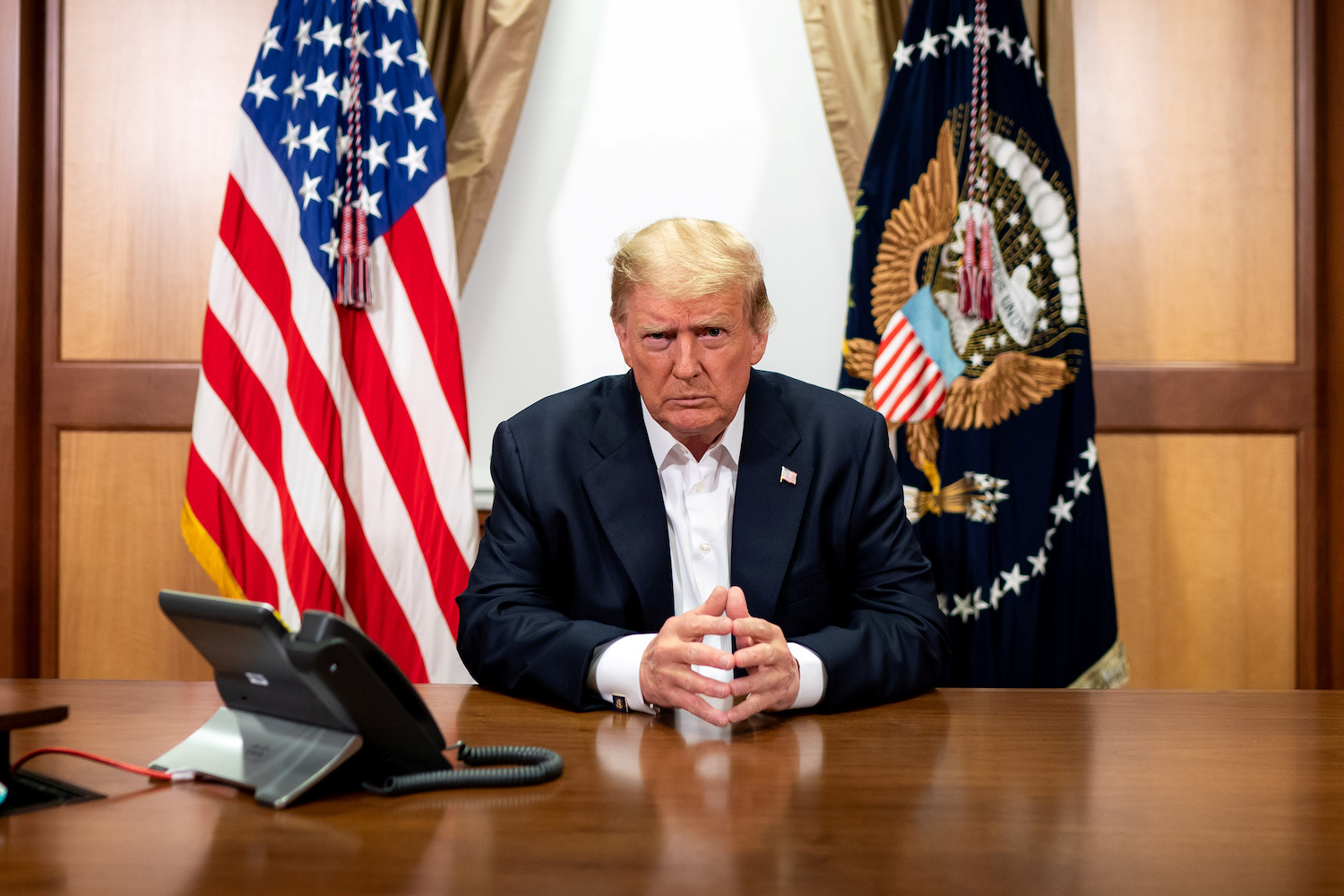President Donald Trump on Tuesday called off talks on a new stimulus plan to boost the Covid-ravaged US economy until after the election, sending Wall Street plunging and upending recent progress made in the long-delayed negotiations.
The afternoon tweet undid optimism that had developed in recent days after House Speaker Nancy Pelosi and Treasury Secretary Steven Mnuchin resumed talks on a follow-up measure to the $2.2 trillion CARES Act passed to blunt the coronavirus downturn.
But Trump struck a more conciliatory tone that night, tweeting he would immediately sign a Congressional bill guaranteeing a second round of $1,200 stimulus checks and $135 billion for small businesses – two elements that were already included in the negotiations.
Federal Reserve Chair Jerome Powell had hours before repeated his call for additional spending to help the world’s top economy weather a downturn that has left tens of millions unemployed and caused a historic contraction in the second quarter.
But Trump accused the Democratic House leader of negotiating in bad faith, and said he had asked Senate Majority Leader Mitch McConnell to instead focus on confirming his appointed judge to an opening on the Supreme Court.
“Nancy Pelosi is asking for $2.4 Trillion Dollars to bailout poorly run, high crime, Democrat States, money that is in no way related to Covid-19,” Trump tweeted, citing an incorrect figure for the Democrats’ latest proposal.
“We made a very generous offer of $1.6 Trillion Dollars and, as usual, she is not negotiating in good faith. I am rejecting their request, and looking to the future of our Country.”
He added that after the election, which he said he would win, “we will pass a major Stimulus Bill that focuses on hardworking Americans and Small Business”.
The president’s tweet sucked the enthusiasm from Wall Street traders who had been hoping for another injection of congressional cash, sending the Dow and S&P 500 tumbling more than one percent each.
Trump’s rival for the White House Joe Biden said the president had “turned his back on every single worker whose job hasn’t come back yet…. He turned his back on families struggling to pay rent, put food on their table, and take care of their kids.”
Support needed
The president said he told McConnell to focus the Republican-controlled chamber on confirming Amy Coney Barrett to the Supreme Court seat vacated last month by the death of Ruth Bader Ginsburg, which would give conservatives a solid six-to-three majority.
Earlier in the day, Powell told an economics conference the US recovery from Covid-19 would be “stronger and faster” with more government aid to protect against the possibility of accelerating job losses.
“Too little support would lead to a weak recovery, creating unnecessary hardship for households and businesses,” Powell said.
“Even if policy actions ultimately prove to be greater than needed, they will not go to waste.”
The CARES Act passed as the pandemic struck in March included extra $600 weekly payments to the unemployed as well as a program of loans and grants for small businesses.
However, both expired around the end of July and despite weeks of talks, Pelosi, Mnuchin and other top officials remained far apart on how much more to spend in another bill.
Any measure was expected to partially restore the weekly payments to the unemployed and the program of small business aid.
It also could have given additional funds to hard-hit airlines that laid off more than 30,000 people at the start of October after funds budgeted under the CARES Act expired.
In his late-night tweet, Trump also called on Congress to approve $25 billion to support the floundering aviation industry.
Trading on hope
Art Hogan, of National Securities, said hopes for additional spending from Congress played a key role in Wall Street’s recent gains but “that door that was open a sliver has shut.”
Labor Department data released last week showed the pace of hiring in September slowed from the month before, with a disappointing 661,000 jobs added.
Meanwhile, data shows more than 800,000 people filing new claims for jobless benefits each week, still above the worst single week of the 2008-2010 global financial crisis more than six months after the business shutdowns began.
Traders were happy to see Mnuchin and Pelosi revitalise talks last week, Hogan said, but now they’ve been let down.
“This has gone from being a tailwind to being a headwind for this market,” he said.
Call for bailout for airlines
Late on Tuesday President Trump said Congress should quickly extend $25 billion in new payroll assistance to US passenger airlines which have put thousands of workers on furlough as air travel remains down sharply amid the pandemic.
Trump’s new demand came hours after he said his administration would abandon talks with congressional Democrats over proposals to spend at least $1.6 trillion in additional coronavirus relief funds – a move that appeared to scuttle a $25 billion bailout for US passenger airlines to keep tens of thousands of workers on the job for another six months.
But Trump later issued a call on Twitter, urging Congress to “IMMEDIATELY Approve 25 Billion Dollars for Airline Payroll Support…. I will sign now!” he wrote, saying Congress could tap unused funds from prior coronavirus relief to fund airlines and a separate program for small business.
American Airlines and United Airlines last week began laying off 32,000 workers, but had said they would reverse course if lawmakers reach a deal on a new government program to fund payroll costs.
A prior $25 billion airline payroll support program of mostly cash grants approved by Congress in March expired on Sept. 30.
House Speaker Nancy Pelosi last Friday expressed support for a standalone bill to keep airline workers on the job if a broader package could not be reached.
Congress is expected to return to session on Oct. 19 and lawmakers may make a new attempt to pass a standalone measure to provide the $25 billion sought by airlines but the prospects are uncertain, even though the airline relief enjoys strong support in both the House and Senate.
One remaining issue is how Congress would pay for the new funding.
Airlines for America, the trade group representing major US airlines, said “thousands of airline workers across the country have already lost their jobs – and more furloughs are expected in the coming weeks.” But the group added “there is a glimmer of hope that our leaders in Washington will act and save these jobs before it’s too late.”
The US Travel Association said “with millions of Americans suffering, it is woefully short-sighted to end relief negotiations” and added that “without immediate aid, 50% of all travel-supported jobs will be lost by December – an additional loss of 1.3 million jobs.”
US airlines are collectively burning about $5 billion of cash a month as passenger traffic has stalled at around 30% of 2019 levels. After tapping capital markets, they say they have enough liquidity to last them at least 12 months at that rate.
Between voluntary and involuntary furloughs, the major US airlines’ workforce will shrink by at least 25% in October.
Industry experts expect a slight improvement in domestic demand over the winter holidays from current levels, but it will remain far below last year’s volumes. Meanwhile, higher-margin business and international travel remain severely depressed.
Chief executives acknowledge that pre-pandemic air travel demand is unlikely to return for years, and still unknown is how the pandemic, which has forced drastic changes in habits, will impact travel behaviour.
American Airlines said it will end service to 11 smaller airports today (Wednesday) after Congress failed to approve additional aid.
AFP, with reporting by Reuters
























